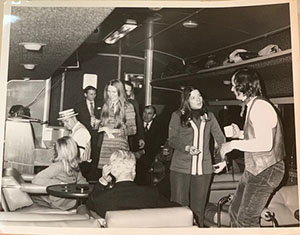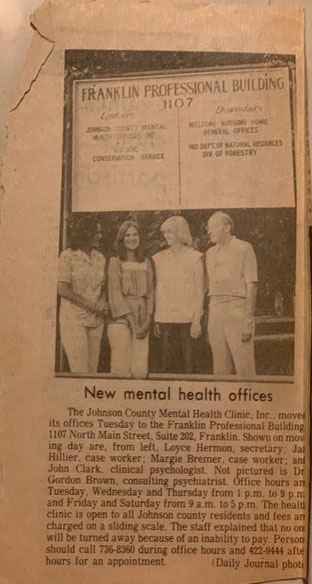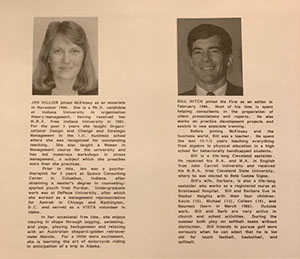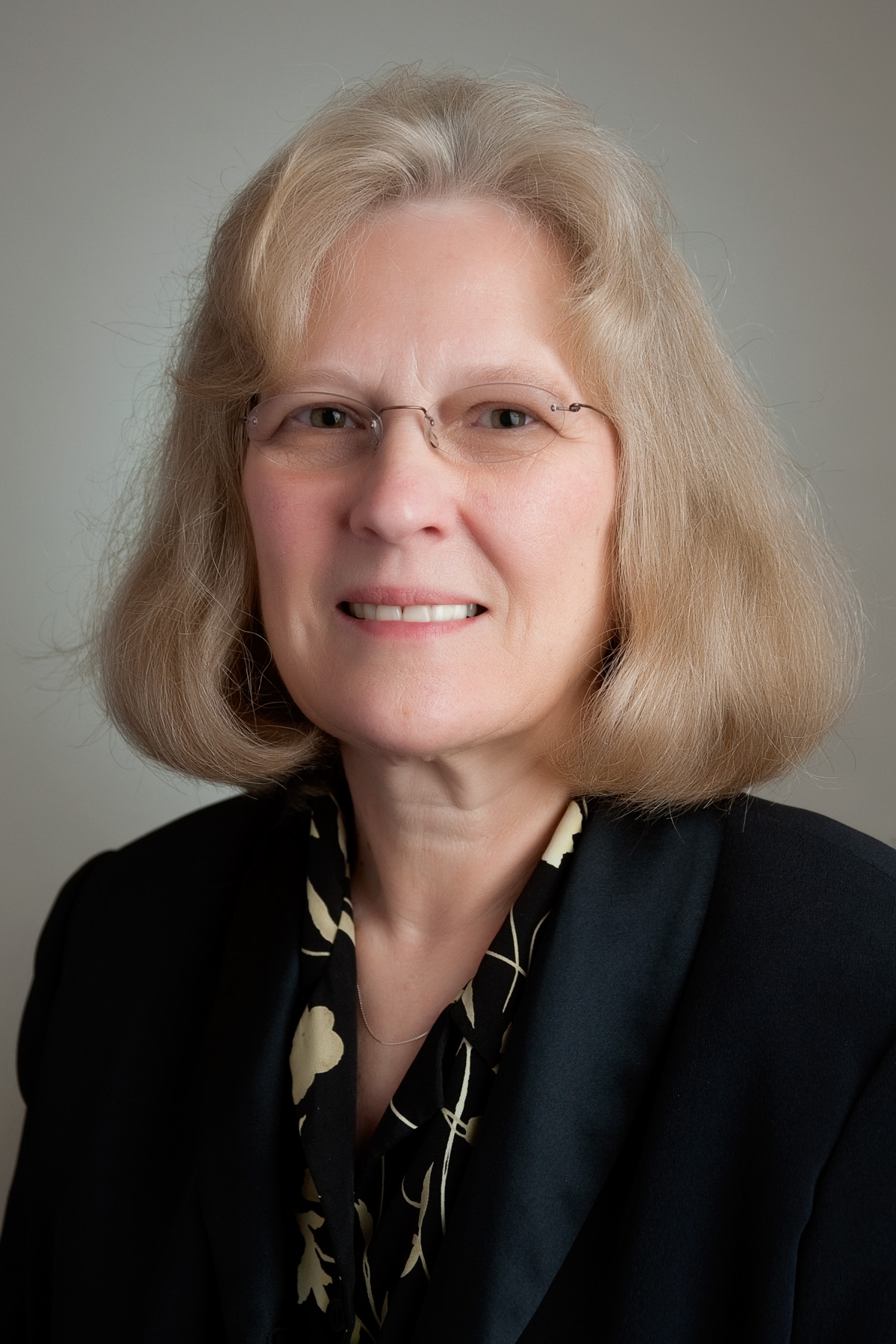LAMP faculty member Jan Hillier Retires
By Laresa Lund
Friday, October 9, 2020
After a long and storied career, LAMP Professor Jan Hillier recently retired from teaching at Indiana University. Hillier spent a decade teaching MBA students, Kelley undergraduates, and LAMP students as a Clinical Associate Professor of Management in the Kelley School of Business. By the end of her tenure, Hillier had taught roughly one-third of LAMP students in “BUS-X 333 - Managing Business Functions.”
We sat down with Hillier to learn more about her career journey, her experience as a LAMP faculty member, and her plans for retirement.
LAMP: Could you give us an overview of your college and career experience?
Hillier: Sure (laughs). In short, I spent about five years doing Amtrak and going to the beach and being in Idaho and doing VISTA, then I spent five years working as a psychotherapist, then I spent five years in business school (between my MBA and PhD), then I spent five years at McKinsey [Consulting], five years as a hospital administrator, and then finished up with 10 years as a faculty member at IU.
LAMP: Tell us about your own undergraduate experience.
Hillier: I’m originally from the Indianapolis area, went to DePauw University for undergrad (1967-71), and studied Sociology and Psychology. DePauw had a great program – the Great Lakes Colleges Association Urban Studies Program. Through the program, I had an opportunity to go to Philadelphia and work at a place called Gaudenzia House, which hosted a rehabilitation program for people struggling with addiction.
I had gone to a majority white high school in Indianapolis, an all-white church, and DePauw was majority white. In Philadelphia, I met a lot of Black and Puerto Rican people, and was seeing police brutality – and this was during the height of the antiwar movement. It was just the beginning of me seeing the world through a set of new lenses.
LAMP: What was your first job post-grad?
Hillier: Well, I had enough credits to graduate a semester early which I spent on Maui, much to the dismay of my friends still finishing their coursework at DePauw. Then, I went to Florida for the summer and waitressed. So, between Florida and Hawaii, I spent eight months on the beach (laughs). So that was a great way to get out of college.
My first “real job” was as a Passenger Service Representative with Amtrak – which had just become Amtrak. It was the greatest job to get after college, because I got to ride trains all over the country. One of the routes that I worked on went through Glacier National Park, back when there were still glaciers there. The porter would wake me up at 5 AM and we’d hang out the vestibule and look up at the most beautiful mountains and glaciers.
Back then, Amtrak would get conflicting reports from passengers and the railroad companies about whether or not the trains were on time. So, part of my job was to provide reports of what was going on with the trains. They also wanted to know whether the trains were clean and well-run – I was on a train to New Orleans once where someone screwed up and put gas in the water tank. I was in the dining car, and I saw gas fumes coming up out of the water glasses, and I just said “stop – we have to stop.”
 And then we all spent several weeks in D.C. writing all the commentary about the trains, which had last been updated in the 1950s (it was now the 1970s). I wrote all of the commentary about the trains going west – going through New Mexico and the Rocky Mountains. In the end, I left Amtrak to join Volunteers in Service to America (VISTA).
And then we all spent several weeks in D.C. writing all the commentary about the trains, which had last been updated in the 1950s (it was now the 1970s). I wrote all of the commentary about the trains going west – going through New Mexico and the Rocky Mountains. In the end, I left Amtrak to join Volunteers in Service to America (VISTA).
LAMP: Where did you go for your VISTA service, and what did you do?
Hillier: I was the only person in my group who actually quit a full-time job to join VISTA (laughs). I was placed in Boise, Idaho working with the Mental Health Association there, which was the beginning of my interest in mental health. The city had a really interesting drug rehab program, so I got to know some of the counselors there, and I just liked who they were as people. They had Gestalt therapy training, and they were people who took responsibility for their actions in life – and that’s who I wanted to be. I stayed in Idaho for two and a half years after that (1973-75), and took some additional psych courses at Boise State to explore my interests. During that time I worked for Planned Parenthood and spent a lot of time skiing. In 1975, I left Idaho and went to Purdue University to pursue a master’s degree in counseling.
LAMP: What did you do with your counseling degree?
Hillier: I got my first therapy job in Franklin, Indiana. It was my first time working as a therapist, and I was the only full-time person in the clinic. I was able to move to a mental health center a year later in Columbus, Indiana. I really loved that job but I came to realize that I get bored really easily (laughs). I enjoyed the steep learning curve in the beginning, and the growth had become slower over time.
I knew that I needed to either go get a PhD so that I could go in to private practice, or go back to school and learn something else. I had a friend at the time who encouraged me to go to business school. There was an emerging field called organizational development, where you could help companies become more effective, which I found very interesting.
LAMP: Tell us about your experience in business school.
Hillier: IU had a really good MBA program and I was just terrified. I remember the night before the accounting midterm there was a review session and I raised my hand and said, ‘okay, explain debits and credits again,’ and the whole class laughed. So, when we got the exams back a couple of days later, mine was the last one he handed out. I thought, ‘oh my god, I got a zero or something.’ He looked at the whole class and said, ‘She got 100 – she got the highest score in the class.’
I just had to study really hard, because none of it was intuitive to me – I was a psychotherapist when I started. Toward the end of my program, I started getting recruited by the management department to stay for a PhD, because I thought about things very differently. I was always raising the ‘why are they doing that?’ question, or ‘what about this,’ or ‘what about that.’ So, I decided I would stay for the PhD program.
All of my papers throughout the PhD program – I was trying to understand power. The working title of my dissertation ended up being ‘Competence versus Connection’ to explore how and why executives were promoted into their positions. As I neared the end of my PhD program, I started getting antsy. I had done five years between Amtrak and Idaho, five years in therapy, five years in the business school. I submitted my resume to the job placement office, just to see who picked me out. Three companies picked me for interviews. One was McKinsey. To my surprise, I got a job offer. So, after I passed my field exams for my PhD, I accepted.
LAMP: What was your time at McKinsey like?
Hillier: I did a lot of writing, editing, and hard-core research as a consultant. The internet wasn’t as readily available then, but we looked at: ‘What is the competition doing?’ ‘What is the main problem?’ ‘What is going on in the world that we aren’t thinking about, and how can we prove our point?’ It was always about getting evidence. I also did a lot of interviewing, because of my psych background. I could probe and push harder and hear the nuance in someone’s voice – and that would give me clues about where I should be looking in the company. I saw things differently, and was always looking for patterns within the organization, and with people’s behavior.
I really liked the variety of the lifestyle of being a consultant. With traveling – there’s sort of a frenetic energy – waking up in the morning and not sure which city you’re in.
LAMP: Tell us about your time as a hospital administrator.
Hillier: I consulted again for a few years and worked with a manufacturer helping them do strategy, marketing, and leadership development. Then I got a call about being a hospital vice president on the west coast, because I had both consulting experience and had worked as a psychotherapist. Also, during my time at McKinsey, I had done a lot of pro-bono work for a local clinic. I loved that job. It was always something new, always a 12-hour day – I never got home before seven or eight, ever. It was very interesting, healthcare was, and still is, in the middle of rapid change. I also spent a couple of years doing leadership and organization development at a hospital in Baltimore.
LAMP: And then you came to teach at IU?
Hillier: Yes. After that, I heard that IU had a job posted and that they were looking for someone with a PhD and with a lot of professional experience. So, I came here and taught for the Kelley undergraduate, MBA and the Kelley Direct (online) programs. A year later, Jim Madison and Jane Rogan met with me and asked if I could teach X-333 for LAMP. I was really excited about teaching for LAMP – and to this day, it remains my favorite memory of my time at IU.
For X333, I tried to create an introduction to strategy, organization, culture, marketing, finance, operations, and the case method. I also tried to teach a little bit about business writing. I also taught LAMP-L 216, “Leadership: The Inner Side of Greatness,” and later taught that course as a class in the Hutton Honors College.
LAMP: What was your impression of LAMP students throughout the years?
Hillier: LAMP students really have a willingness and eagerness to learn that you don’t see all the time. They’re willing to work hard, they like challenges, and they are open to new ideas – open to discussion. I always had robust discussion in my classes – I never worried about those classes going badly. In fact, I worried instead about having enough time to get through all the content and materials, because the discussions would go so well and take some time. I really wanted my students to understand money. You can have a lot of different attitudes about it, but business is about money.
LAMP: Do you have any specific plans for your retirement?
Hillier: Well, with COVID our plans have been put on hold for the time being. But our plan is to buy an RV and travel the US. I’ve been to all 50 states, but I’d love to spend more time in Utah, Alaska, Idaho and Washington. We might move back out west again. I also want to spend time with family and continue with service work. I’m currently volunteering quite a bit and making calls for the 2020 presidential election.
LAMP: Do you have any advice for LAMP students and alumni?
Hillier: Keep your resume up to date and explore every opportunity that presents itself. Every time I get on LinkedIn, I see that people are changing jobs on a regular basis now. I would also recommend seeking out service opportunities. I tried to do a lot of service throughout my career – first in VISTA, then with Planned Parenthood, with pro-bono work at McKinsey, and then later I was involved as an advisor for student groups at IU, including 180-Degrees Consulting. I always took the time to talk to students about their interests and get to know them.
Also, if you have a partner and you both work long hours – you have to make sure you communicate. My husband and I talked on the phone every night when we were in different cities. We always knew what the other was doing during the day, and how things were going.
